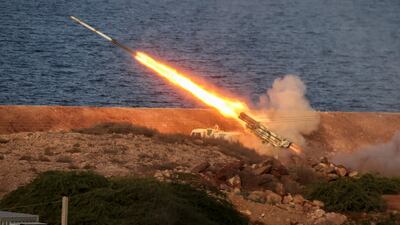Britain on Friday condemned Iran's launch of ballistic missiles during war games conducted this week.
“The launch is a clear breach of UN Security Council Resolution 2231, which requires that Iran not undertake any activity related to ballistic missiles designed to be capable of delivering nuclear weapons — including launches using ballistic missile technology,” the Foreign Office said in a statement.
“These actions are a threat to regional and international security and we call on Iran to immediately cease its activities.”
Iran’s paramilitary Revolutionary Guard fired 16 surface-to-surface ballistic missiles during a continuing military exercise across the country’s south, the official IRNA news agency reported on Friday.
The report listed the missiles used as the Emad, Ghadr, Sejjil, Zalzal, Dezful and Zolfaghar, with ranges between and 350 and 2,000 kilometres.
State TV showed missiles launching in the desert.
Iran says these short-range and medium-range missiles can reach US bases in the region, as well as Israel.
The IRNA report said the missiles successfully hit one target at the same time as 10 drones simultaneously hit their targets.
During the second day of the drill on Tuesday, Iran also launched cruise missiles.
Iran holds military exercises from time to time that it says are aimed at improving the readiness of its forces and testing new weapons.
But Maj Gen Mohammad Hossein Bagheri, chief of staff of Iran’s Armed Forces, said the missile drill this week was an answer to Israel’s recent “massive but pointless threats” against Iran.
“This was a tiny part of hundreds of missiles that can hit any hostile target simultaneously,” he said.
Israel has long seen Iran’s nuclear programme as a threat and seeks a harder line against it from the US and international community. Iran claims that its nuclear programme is peaceful.
The five-day annual exercise that began on Monday came days after a break in talks to revive Tehran’s nuclear pact with world powers. The talks will resume on Monday.
Iran has accelerated its nuclear programme over the past year as the negotiations have struggled to make headway. The 2015 pact lifted sanctions on Iran in exchange for curbs on its nuclear activities.
Former US president Donald Trump pulled the US out of the deal and reimposed crushing sanctions on Iran in 2018. Tehran has since increased its uranium enrichment up to 60 per cent purity — a short technical step from the 90 per cent needed to make an atom bomb.







